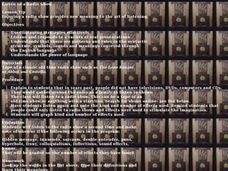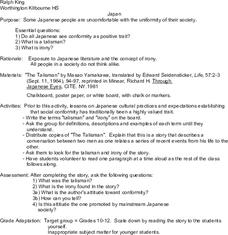Curated OER
Irony
You will want to listen to the famous song, "Ironic," by Alani Morissette, after viewing this short PowerPoint. The three slides in this slideshow include a definition of irony, verbal irony, and dramatic irony. Tip: Ask your class to...
Curated OER
Sarcasm
Learners often regard sarcasm as a "you know it when you see it" language phenomenon, leading to confusing tone and humor in student writing. This presentation not only defines sarcasm (and irony) in plain terms, it also provides many...
Curated OER
"how I Edited an Agricultural Paper Once"
Young scholars identify the point of view of the story. They describe tone of story using at least 3 examples and describe satire and provide at least 3 examples. They identify and describe at least 3 examples of irony and write and...
Curated OER
Literature: Satire in the American Dream
Eleventh graders examine cartoons for examples of satire, irony, and sarcasm. They write essays about cartoons, art work, or literature analyzing it for satirical elements. Finally, they create their own piece in one of the three areas...
Curated OER
Analyzing Irony in Nonfiction
Students examine the use of irony in non-fiction works. In this literature lesson, students read non-fiction war texts and explore the use of irony in the piece as they respond to discussion questions.
Curated OER
Understanding Irony
Students discuss irony. In this language arts lesson, students identify irony and give examples of irony from their lives, a book, and current events. Students classify types of irony.
Curated OER
Identifying Irony
In this identifying irony worksheet, 9th graders read 6 paragraphs, identify the type of irony being used (dramatic, situational, verbal) and explain their answer.
Curated OER
Classic Short Stories by Kate Chopin
Learners read two classic short stories by Kate Chopin and write a comparison of the stories. For this short story comparison lesson, students read 'Desiree's Baby' and 'The Story of an Hour' and analyze the foreshadowing and irony....
Curated OER
Editorial Cartoons: A Historical Example of Immigration Debates
Eleventh graders analyze political cartoons. For this American History lesson, 11th graders research the Chinese Exclusion Act and the current arguments about immigration to the United States. Students create a graphic organizer...
Curated OER
Listen to a Radio Show
Students practice the art of listening. In this listening skills lesson, students listen to an old-time radio show and identify hidden messages, innuendo, sarcasm, double entendres, puns, hyperbole, irony, colloquialisms, inflections,...
Curated OER
Beyond Chopsticks and Rice
Students explore the stereotypical American images of China. In this English and World History lesson, students read a novel to become familiar with China and its people. Students research various events in China's history and report...
National First Ladies' Library
Will Rogers
Learners explore the concepts of irony and humor. They discuss Will Rogers' history and determine that he was a humorist who many viewed as very wise. They read quotes of Will Rogers and determine that everybody is ignorant, only on...
Curated OER
The Gift of the Magi Lesson Plan Two
Ninth graders read, "The Gift of the Magi," discuss the multiple themes of the story and situational irony. Individually, 9th graders review questions from the study guide, explore the simile, metaphor, and allusion. Students prepare...
Curated OER
Gift of the Magi LP3
Students read the story of "The Gift of the Magi" and identify the theme and elements in the story. They discuss allusions, situational irony, simile, metaphor, allusion, irony and plot structure. Students share about sacrifices they...
Curated OER
Gift of the Magi LP2
Ninth graders read the story, "The Gift of the Magi" and identify examples of allusion and situational irony. They define and give examples of situational irony. Students plot sequence, structure, define allusion and give examples.
Curated OER
Persona Poem
Students write a poem from the perspective of the first-person persona. Through the words of the poem, demonstrate a higher level of thinking by providing insight to the personality of the poem's speaker, the "I" who is featured in the...
Curated OER
Humor and Irony in Eudora Welty's The Ponder Heart
Students demonstrate an understanding of humor in writing, specifically the use of irony (verbal, situational, and dramatic). They evaluate an event from his or her life that lends itself to a humorous retelling, and demonstrate an...
Curated OER
Music from a Place Called Half Moon
Students read the novel, Music from a Place Called Half Moon. They are assigned chapters to analyze for literary elements and to assign titles to the book chapters.
Curated OER
Three ways into the play 'Stone Cold'
Tenth graders, in groups, write pieces of a script in a particular style that they are introduced to. They also study how tension and irony work together in scripts.
Curated OER
Japan
Students read the literature of The Talisman in order to make cultural connections and investigate the concept of irony and how it is used in this Japanese text. They also discuss the issue of conformity and its relationship to the story.
Curated OER
Macbeth Presentations
Young scholars make Powerpoint presentations or Web pages about Macbeth. Their presentations must include at least three elements from a provided list. They write reflective papers about their learning experience.
Curated OER
Are You Money Smart?
Learners figure out and discuss the irony of this coin-centric poem. They also practice persuasive letter writing, and identify and count coin/money values.
Cengage Learning
Themes, Perspectives and Issues/edwin Arlington Robinson
In depth site including comparisons, contrasts, form, style and artistic conventions. Great research site!
Georgia Department of Education
Ga Virtual Learning: "The Necklace" by Guy De Maupassant [Pdf]
This is a PDF of a 10-question worksheet for "The Necklace" by Guy de Maupassant.

























![Ga Virtual Learning: "The Necklace" by Guy De Maupassant [Pdf] Unit Plan Ga Virtual Learning: "The Necklace" by Guy De Maupassant [Pdf] Unit Plan](https://d15y2dacu3jp90.cloudfront.net/images/attachment_defaults/resource/large/FPO-knovation.png)